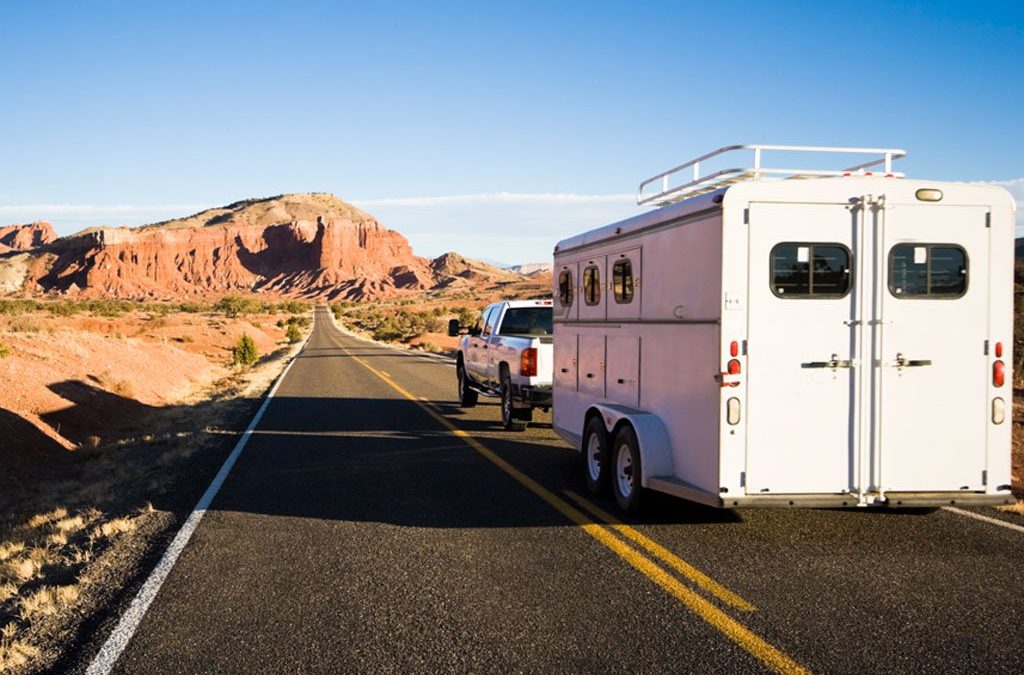How to Feed Your Horse on the Road
Spring is here and with the warmer weather comes thoughts and plans of hitting the road with our horses for trail rides and horse shows. Getting to and from events is fairly straightforward when the distance to travel is short but traveling long distance with your horse involves a bit more planning. Horses are creatures of habit and thrive on routine on a daily basis, so the disruption of normal feeding, sleeping and working schedules associated with travel can be a cause of undue stress for our equine friends.
Preparation and organization is the key to transporting your horse safely while minimizing disruption of normal routine. Following are some guidelines to help you prepare for hitting the highways and enjoying a season full of fun with friends and horses alike.
Several weeks before you are scheduled to leave:
- Make sure your horse is fully vaccinated for not only diseases endemic in your home location but also those in the area you will be visiting
- Get a complete physical done on your horse. Make sure he is fit and capable of staying healthy during the rigors of transport and the stress of change of environment
- If your horse has been unshod, get some shoes on him several weeks before your departure and make sure he is comfortable with them
- Get your horses coggins up –to-date and health papers in order
- Clean out your trailer. There are a lot of molds, pollens and other antigens that reside in a trailer which has been idle for the winter
- Make sure the floor of your trailer is in good order, as well as tires and the spare on your trailer and truck. Get the oil in your truck changed if it has not been done recently. Restock you trailer with water buckets, feed tubs, hay nets and all the other implements you will need for your horse
Routine, Routine Routine!!
The most important aspect of taking your horse out of his current environment into a new one is to try to maintain as much routine as possible. First on this list are the feeds and forages he will be consuming while on the road. Nothing should change if at all possible.
The hay, feed and supplements you are feeding prior to your trip is exactly what your horse should eat on the trip.
For example, it may be smart to slowly adapt your horse to eating pelleted, bagged or cubed forages instead of long stemmed hay several weeks before your departure if this is all that will be available when you arrive at the horse camp, or to save room in the trailer. If you are fortunate enough to pack hay on a rack on top of your trailer, make sure you have enough to take along so you don’t have to switch to a new type of hay on the road. The same applies to concentrates and supplements your horse is currently being fed. It may be a good idea to investigate what types of products will be available at the location you are traveling to.
One way to eliminate packing bulky feed bags and containers is to pre-measure out all concentrates and supplements and take them along in zip lock bags. Pack only what you need plus a bit more in case you get delayed coming home. Be sure to bring along salt as this will be needed to help rehydrate your horse.
Day of departure
It is extremely important that your horse be well hydrated before you leave. Do not work your horse hard for a couple of days prior to leaving to prevent dehydration before commencing on the trip. Feed lots of forage and free choice water and salt to ensure water intake is normal. There is no skimping here – a dehydrated horse in a trailer will be a good candidate for an impaction colic.
Get your trailer ready by hanging hay nets full of hay. Horses should have access to hay while traveling so that when you stop and offer water, they are thirsty. Keep the hay bags or nets at chest level to prevent particles being blown into the horses eyes and nose.
I do not advocate hanging water buckets in the stalls as a sudden stop or swerve can cause a horse to become entangled in the bucket. It is better to stop every two hours or so and offer water then. Be sure to bring plenty of water from home so that your horse is familiar with the way is smells and tastes. Some horses are very picky about their water source! Don’t worry about feeding your horse any concentrates or supplements (medications should however be administered at normal intervals) while traveling. It is better to wait until the horse is off the trailer and settled in before feeding these.
If your journey is to last longer than 8-10 hours, it might be wise to find a horse motel to offload your horse for the evening. Many horses will not relieve themselves in the trailer, so no matter whether you stay for long or not, allow your horse the opportunity to urinate out of the trailer. Bedding the trailer with shaving or straw may also encourage him to urinate while in the trailer.
Arrival at your destination
Before off loading your horse, make sure all the accommodations for your horse are in order. Check paddocks and stall for dangerous items such as nails and bent screw eyes, barbed wire and holes in the paddock. Get his forage, water and salt ready and then take him off the trailer. Give him time to adjust to his new surrounds, perhaps taking a little walk to stretch his legs and get some blood circulation going. Let him settle in for at least several hours before going for a ride and to make sure he is feeling ok. Signs of a horse in discomfort can vary, but keep an eye out for:
- Pawing or attempting to roll
- Biting or looking at stomach or flanks
- Flaring nostrils and rapid respiratory rate (normal is 8-16 breaths per minute)
- Pale mucous membranes on gums
- Rapid heart rate (normal range is 30-40 beats per minute)
- Straining to urinate or defecate
- Profuse sweating
- Elevated temperature (99.5-101.5 F is normal). A temp over 103 or lower than 97 needs immediate vet attention
If any of these symptoms of distress occur, stop as soon as possible and contact the veterinarian nearest your location. It is recommended to have a list of veterinarians or clinics that will be available along your route before you leave. State police will also be able to help locate a veterinarian.
When all seems fine, saddle up and head out or get ready for a big day of showing!
This blog post was originally posted on Wednesday, May 23rd, 2012 at Equine Nutrition and Health Services Blog. Blog article was re-posted with permission from blog owner, all rights reserved.

